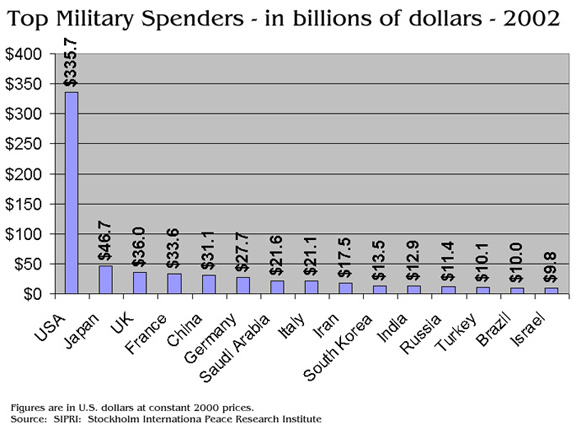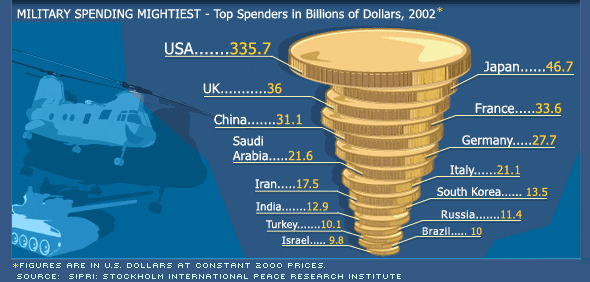Bush's budget (and privatizing the Iraq occupation) has resulted in lucrative contracts for mercenaries and military contractors while denying low-pay grade soldiers a living wage and adequate V.A. benefits.
The Bush adminstration isn't "supporting the troops", it's supporting the defense contractors corporate executives.
Source: "Questions, Not Just on Iraq" - NY Times - February 17, 2008
Shameful details continue to emerge on the neglectful care extended to soldiers wounded in Iraq and Afghanistan. The Army’s inspector general reports that more than nine out of 10 disabled veterans have been kept waiting for benefit evaluations beyond the 40-day limit set by the Pentagon. Some have waited up to a year and a half for benefits.
Source: "When Warriors Come Limping Home" - NY Times - 3/14/07
"These people are being systematically underrated," said Ron Smith, deputy general counsel for Disabled American Veterans. "It's a bureaucratic game to preserve the budget, and it's having an adverse affect on service members."
[I]n the Army - in the midst of a war - the number of soldiers approved for permanent disability retirement has plunged by more than two-thirds, from 642 in 2001 to 209 in 2005, according to a Government Accountability Office report last year. That decline has come even as the war in Iraq has intensified and the total number of soldiers wounded or injured there has soared above 15,000.
While the number of soldiers placed on permanent disability retirement has declined in the past five years, the number placed on temporary disability retirement - with medical conditions that officials rule might improve so they can return to work over time or worsen to the point that they must be permanently retired - has increased more than fourfold, from 165 in 2001 to 837 in 2005.
Troops on temporary disability leave convalesce for 18 months while receiving reduced basic pay. After 1˝ years, they are reevaluated and either returned to duty, or rated for separation or permanent disability retirement, or sent back to temporary disability for another 18 months - up to five years.
Along with paying them reduced wages during that time, the eventual reevaluation often leads to downward revisions in their disability ratings - and lower disability payments.
The system "has become less friendly toward service members with compensable decisions on disability" in the past few years, especially since the war in Iraq began, [lawyer, Mark] Waple said.
"I think there is a definite bias on the physical evaluation board to medically separate service members with a zero-, 10- or 20-percent disability rating when it ... should be medical retirement."
Source: "Critics: Army Holding Down Disability Ratings" By Kelly Kennedy - Army Times 24 February 2007
The Bloated Military Budget
The Bush administration has increased defense spending to over $400,000,000,000 (four hundred billion) dollars per year. That's over $1 billion PER DAY. That's over $1400 for every man, woman and child per year, or almost $4 PER DAY for every man, woman and child.
The Pentagon's record keeping system is so outdated and overwhelmed that it is unauditable. No one even knows where all the money goes.
The ruse that is used to justify the enormous outlay of public resources is best termed as "threat inflation." This is a standard tool used by the government to convince a misinformed nation to allow its treasure to be confiscated and distributed among the various cadres in what President Eisenhower called the "military-industrial complex."
A example of threat inflation took place in the 1960s during the Vietnam war. The nation was led to believe that if we didn't stop the North Vietnamese from taking over South Vietnam, the result would lead to a "domino effect" that would result in the gradual replacement of democracy with communism throughout the world. As history records, Saigon fell to the North in 1974, and since then Vietnam has gradually reverted to a quasi-free market economy. Democracy survived.
A more recent example of threat inflation is the invasion of Iraq in 2003. George Bush and his advisors assured an anxious nation that Iraq posed an "urgent threat" to the United States. This threat was composed of a large stockpile of weapons of mass destruction along with a revitalized nuclear weapons program. As we now know, neither existed.
The Bush administration has repeatedly used the threat of terrorism to bolster its case for increases in defense spending. But terror threats such as the one on 9/11 require a different sort of defense than the administration advocates. A proper response to terrorism is increased sensitivity to other cultures, increased intelligence penetration of terrorist organizations worldwide, a reassessment of our foreign policy, and better sharing of information among intelligence organizations. The problem for the Bush administration is that these solutions don't generate huge contracts for the corporations that manufacture gigantic defense systems such as airplanes, strategic missile defense systems, tanks, missiles, submarines, aircraft carriers, etc. For this reason, the Bush administration in collusion with the congress continues to insist that it needs the tools of the Cold War (and even World War II) to fight the war on terror. Diverting recourses from domestic security processes and local first responders into the weapons systems of bygone eras makes us in fact less safe, not more secure.
Military Personnel
While defense industry executives get rich and congressmen provide enough pork-barrel projects to their districts to ensure their reelections, the nations soldiers often struggle on the battlefields with inadequate equipment. During the Iraq invasion, there were numerous reports of machine guns jamming due to design and manufacturing flaws, of inadequate supplies of body armor and other supplies, etc.
Senators of both parties said on Tuesday [2/15/05] that President Bush's budget for veterans' health care would not provide enough money to maintain services at current levels, much less care for thousands of veterans streaming back to the United States from Iraq and Afghanistan.
Five veterans groups, including the American Legion, denounced a proposal in Mr. Bush's budget [regarding co-pays and annual fees].
Senator Daniel K. Akaka of Hawaii, the senior Democrat on the committee, said a goal of the proposed fees and co-payments was to make it "prohibitively expensive" for some people to use V.A. clinics and hospitals. The new charges, Mr. Akaka said, would lead more than 192,000 people to drop out of the veterans health care system.
Senator Patty Murray, Democrat of Washington, said, "Serving veterans is part of the cost of war, but there's not one dime for veterans" in the $81.9 billion request that Mr. Bush sent Congress on Monday [2/14/05] to cover the costs of operations in Iraq and Afghanistan."
The president's budget would save $293 million by reducing federal payments for state-run homes that provide veterans with long-term care. It would also save more than $100 million with a one-year hiatus in federal spending for construction and renovation of such homes.
Peter S. Gaytan, director of health care and benefits at the American Legion, told Congress that the Bush administration was trying to "balance the V.A. budget on the backs of America's veterans."
Source: "Senators Question Adequacy of Bush Budget for Veterans" by Robert Pear - New York Times - 2/16/05
On January 17, 2003, Bush visited 5 soldiers injured in Afghanistan at the Walter Reed Medical Center. He praised Army doctors and said, "We should and must provide the best care for anybody who's willing to put their life in harm's way." ("Bush Visits Soldiers Mending from Afghanistan Wounds," Associated Press, 1/17/03) The previous day, Bush's Department of Veterans Affairs announced it was cutting off access to its health care system for 164,000 veterans who were expected to enroll in the current fiscal year.
Source: ("VA Cuts Some Veterans Access to Health Care," Washington Post, 1/17/03) via DeanForAmerica.com
Just before Memorial Day, Veterans Affairs Secretary Anthony Principi said, "Our active military respond better to Republicans" because of "the tremendous support that President Bush has provided for our military and our veterans." The same day, the White House announced plans for massive cuts in veterans' health care for 2006. Last January, Bush praised veterans during a visit to Walter Reed Army Medical Center. The same day, 164,000 veterans were told the White House was "immediately cutting off their access to the VA health care system." My favorite in this category was the short-lived plan to charge soldiers wounded in Iraq for their meals when they got to American military hospitals. The plan mercifully died a-borning after it hit the newspapers. In January 2003, just before the war, Bush said, "I want to make sure that our soldiers have the best possible pay." A few months later, the White House announced it would roll back increases in "imminent danger" pay (from $225 to $150) and family separation allowance (from $250 to $100). In October 2003, the president told troops, "I want to thank you for your willingness to heed the important call, and I want to thank your families." Two weeks later, the White House announced it opposed a proposal to give National Guard and Reserve members access to the Pentagon's health insurance system, even though a recent General Accounting Office report estimated that one out of every five Guard members has no health insurance. What a nice thank you note. A month before the war started, the White House proposed cutting $1.5 billion from funding for military housing. The House Armed Services Committee had concluded that thousands of military families were living "in decrepit and dilapidated military housing."
Source: "Bush's kiss of death -- Look out if the president starts praising your program -- you're next on the chopping block" by Molly Ivins - Creators Syndicate - 06.08.04
Military Contractors
The military buildup that has taken place under the Bush administration has resulted in an enormous infusion of taxpayer dollars into the defense industry. Where does that money go? An analysis of CEO salaries of four of the big defense contractors sheds some light on that issue.
| Corporation | CEO Salary | |
| Year | Amount | |
| Lockheed Martin | 2000 | $5.8 million |
| 2002 | $25.3 million | |
| General Dynamics | 2001 | $5.7 million |
| 2002 | $15.2 million | |
| Honeywell | 2000 | $12.9 million |
| 2002 | $45 million | |
| Northrop Grumman | 2000 | $7.3 million |
| 2002 | $9.2 million | |
[A] deal, initiated by Boeing lobbyists shortly after the September 11 terrorist attacks, lets the world's largest airplane maker lease 100 of its commercial jets to the Air Force for conversion into refueling tankers. The lease pays a sweet $20 billion to Boeing – way more than the Air Force would pay simply to buy the tankers. It was a closed-door deal – done without competing bids and without congressional hearings or a vote. Oh... it also includes a 15 percent profit for Boeing – triple what it makes selling commercial planes.
Boeing spends some $6 million a year on lobbyists. It's also a $2 million annual political contributor (including having given $100,000 to help pay for Bush's inaugural festivities), so it has lots of insider clout.
Source: JimHightower.com -- "GREASING THE SKIDS FOR CORPORATE WELFARE" -- 8/6/2003
The next time you hear Bush or his staff insist that more money is needed for defense, remember that the lions share of the money they are demanding goes not to the deserving soldiers in the field or veterans here at home, but rather to the corporate barons that fund their campaigns.

Source: Compiled from data from PBS "Now" with Bill Moyers

Source: PBS "Now" with Bill Moyers